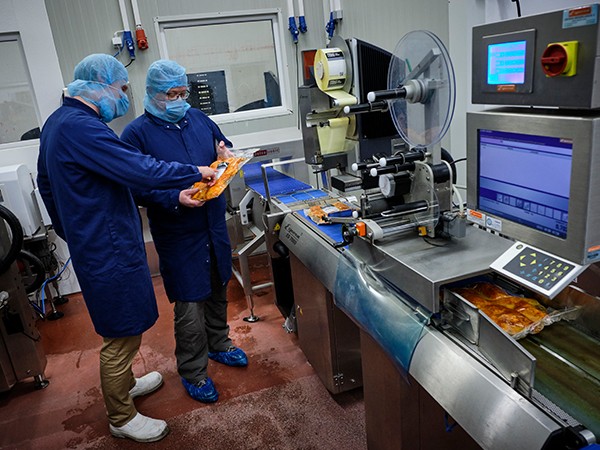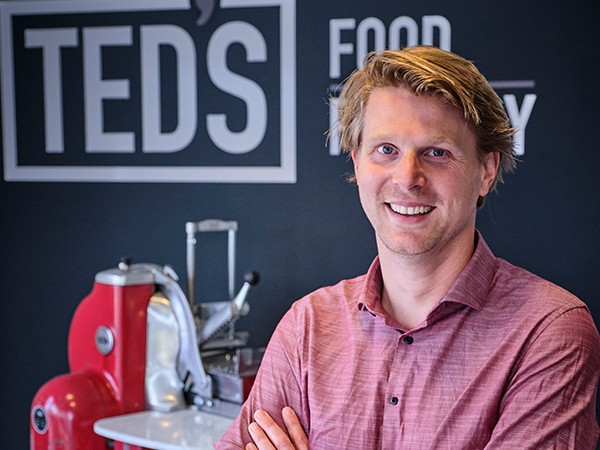
The range at TED'S Food Factory is often developed together with the customer. The company also asked for tailor-made solutions for their machinery. As a result, a full service contract was concluded with Espera for the weighing and labelling machines.
It is a quarter past ten on Thursday morning when the first hot meal is tasted: a vegetarian mash with a crispy crust and pine nuts. "The mouthfeel is better now than it was yesterday", says the commercial manager at TED'S Food Factory - in short 'TED'S'. The origins of the company may lie in meat, but vegetarian products are now also being produced. A logical step, she says: "We are always innovating. We apply the knowledge we have gained in the production of meat products to new markets." Parallel to the increasing demand for vegetarian alternatives, the commercial manager sees an increasing demand for special meat products. "If meat is to be eaten, it has to be really tasty." With products such as pulled chicken, spareribs and slow cooked bacon, TED'S meets this demand.
The extended range of hams began with a few hams that Ted Duijndam made in the 80's in the basement of the family farm. With his commercial spirit and handmade hams, he went to nearby shops. This was followed by the abattoir in The Hague and then his own factory Duijndam Vleeswaren, which was finally sold. In 2008, Ted Duijndam took over the Vollebregt factory in Zoetermeer, and renamed it TED'S Food Factory last year. The company also consists of TED'S Food Lab, where chefs, butchers, commercial and quality experts work together on product development, and TED'S Kitchen in Heerhugowaard, where meals and pizzas are made in collaboration with top chef Paul Fagel.
In Zoetermeer, where some 50 people work, they still mainly produce meat products: think of tender spare ribs, hand-stopped meatloafs, crispy grill sausage and fresh salad flakes. "Our credo is: making good food is a choice. We make no concessions to taste and structure, and use no unnecessary additives. This can be a challenge for the implementation in the factory. The quality of the product, the scaling up, and the wishes of the customer, such as health covenants, give healthy friction. In addition, we have a large variety in our range and we work with ingredients that have a short shelf life, so we have to organise the processes in and around the factory in a smart way."
In order to maintain the high level of craftsmanship of TED'S products, production is carried out by their own butchers and with flexible machines. "It is a factory process run by craftsmen," says Geert van de Weg, project manager for production. "For example, when the machine mixes the meat, our sausage makers monitor whether the correct binding is achieved. The sausage is then stuffed by hand."

Geert van de Weg
Besides some old butcher friends of Ted, the company mainly serves the retail market. Most of the products have been developed in close cooperation with the customers. "We never say: this is our range, just choose. We work in a very customer-focused way and thus make the difference." TED'S regularly demands this flexibility from its own suppliers. For example, two years ago the owner Ted himself proposed to conclude a contract for Espera's new weighing and labelling machines, similar to a lease contract for his new car. This is to avoid variable maintenance costs. A new dimension in the long collaboration that Jan Zwaan, managing director of Espera Netherlands, also had ears for.
The so-called 'full service contract' means that Espera remains the owner of the machines and is responsible for second-line care. TED'S supervises the daily cleaning and minor maintenance of the machines. For a fixed price, TED's receives all service and spare parts plus the option to convert the machines to meet the changing requirements of the end customer. Van de Weg: "This concept is perfect for food manufacturers like us. Thanks to this construction, in which we leave specialist maintenance to Espera's professionals, we are able to keep our focus on our core business, namely making good food.” Jan Zwaan adds: "The classic contracts focus on maintenance issues, where we often come into the picture when machines are already at a standstill. This contract is aimed at prevention and dialogue." This dialogue was sometimes even more necessary in the beginning, says Geert: "This was a new construction for both of them. There was a field of tension around the question of where exactly whose responsibility stops and that of the other starts. But that was always open to discussion. After two years we have found a good mode and we are very satisfied. That's why we now have two Espera weighing and labelling machines in TED'S Kitchen."
Photos: © Fotobureau Roel Dijkstra
Source: © Vakblad Voedingsindustrie 2019